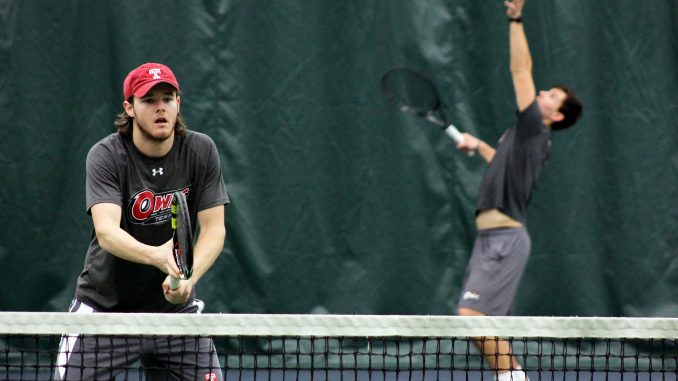
Fall Out Boy’s “Centuries” loudly reverberates throughout the crowded Legacy Center as the men’s tennis team takes the court for practice.
Each day of training starts off the same – a brief calisthenics routine, followed by light volleys and a doubles drill.
A month ago, however, the team went about a different practice pattern.
Early on in the season, coach Steve Mauro didn’t invest as much time on his team’s doubles play, usually working on it toward the end of practice.
After winning all of its double matches against Villanova on Jan. 22, the Owls dropped five out of their next eight doubles contests en route to a 1-3 team record during that span.
After shifting more attention to doubles, the team is 5-1 through its last six doubles matches, and is 3-1 overall in that stretch. Through this past weekend, the Owls are sitting above .500 at 5-4 on the season.
Junior Santiago Canete said the lack of practice hindered the team’s initial doubles performance early in the semester.
“The team was playing well at the end of the fall semester because we were always practicing,” Canete said. “Tennis is something that you must practice all the time to be in your best condition and when you stop practicing, it is hard to compete.”
The team ends regular practice sessions after the Intercollegiate Tennis Association regional tournament at the end of the fall season, as Temple does not have an indoor tennis facility on Main Campus.
“We are practicing more than we did at the end of the fall season,” Canete said. “When the [Intercollegiate Tennis Association] regionals are finished, we don’t practice until after winter break because we don’t have indoor courts. Not practicing for about a month and a half isn’t good.”
The team’s second and third flight doubles pairings have been changed twice through the team’s last few matches.
“We go day by day with our doubles pairings,” assistant coach Frederika Girsang said. “We try them out in our challenge matches and if the coaches like what we see, we try that pairing in a match.”
Even though the doubles teams are 5-1 after the Owls’ previous two matches, Girsang said each duo needs to attack more.
“We try to be more aggressive in doubles,” Girsang said. “We are emphasizing finishing at the net. We also are working on our serves and returns and being ready at the net because that is what doubles is all about. We are getting better with that.”
Canete’s doubles partner has been switched twice this semester, and said such a change can affect performances on the court.
“Our doubles pairings just have to get used to playing together,” Canete said. “When you get used to playing with someone, you can play a lot better. But if you are changing partners all the time, it is tough to play well together.”
Results of a dual match can rely heavily on doubles play, Canete said, as one match point is awarded to the team that wins the doubles battle, along with six remaining singles points.
“If you win the doubles point, it gives the [team] confidence,” he said. “If you don’t you go into singles with a whole different mentality, you only have to win three [singles] matches out of six instead of four.”
Junior Hicham Belkssir has seen these changes and understands that the coaches are doing what they have to do to put the best team on the court each match.
“[The coaches] are always searching for the strongest pairs,” Belkssir said. “They have to continually switch pairings to find the best doubles teams.”
Belkssir said he hasn’t dealt with a pairing switch thus far this season, as he and his partner, junior Nicolas Paulus, have compiled a team-best 3-1 record as the team’s top pairing.
“[Nick] returns the ball well,” Belkssir said of Paulus. “When he plays the ball in the backcourt, he can hit a deep ball, which helps me finish at the net since I have more time to react to the return … that makes us more aggressive in our on-court play because it puts a lot of pressure on our opponent.”
“In doubles we try to relax more,” Belkssir added of his pairing. “We make an effort to play our game and have a little fun while we are doing it.”
Dalton Balthaser can be reached at dalton.balthaser@temple.edu.



Be the first to comment